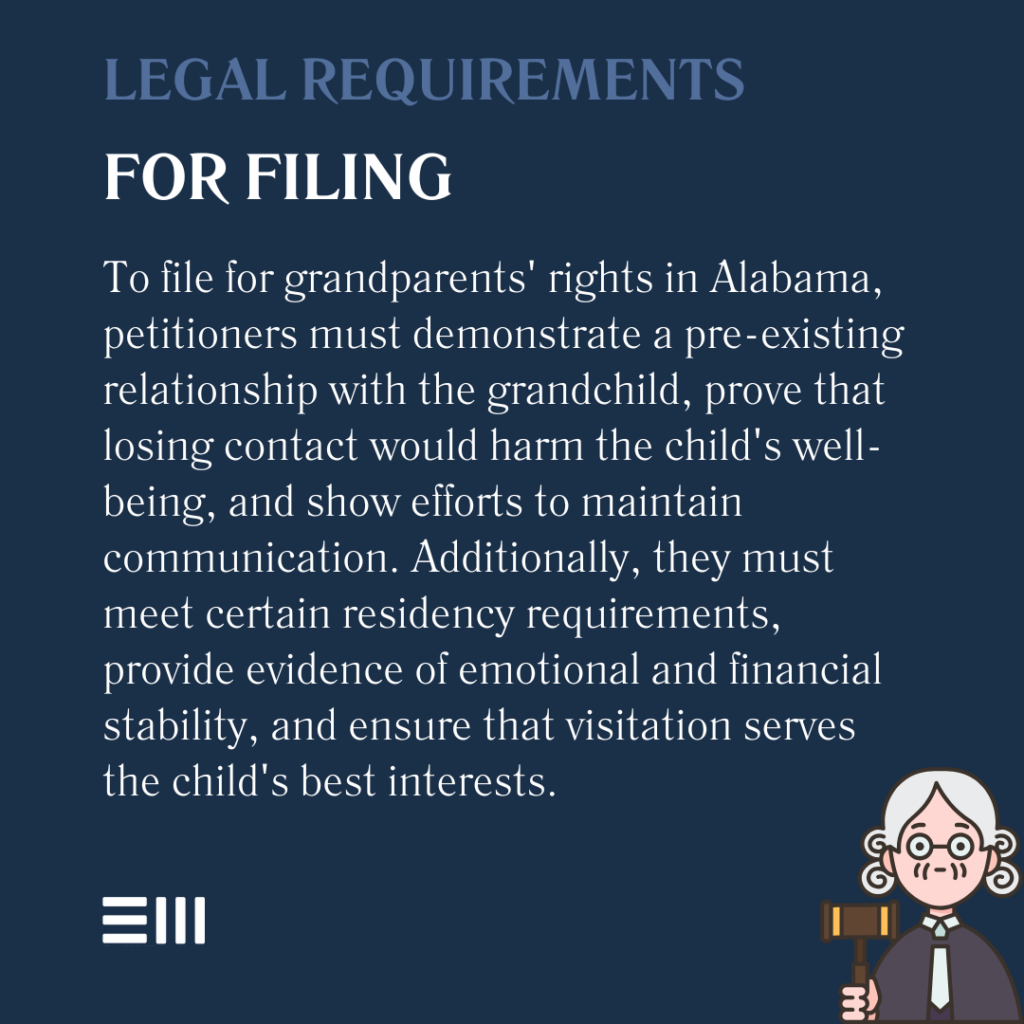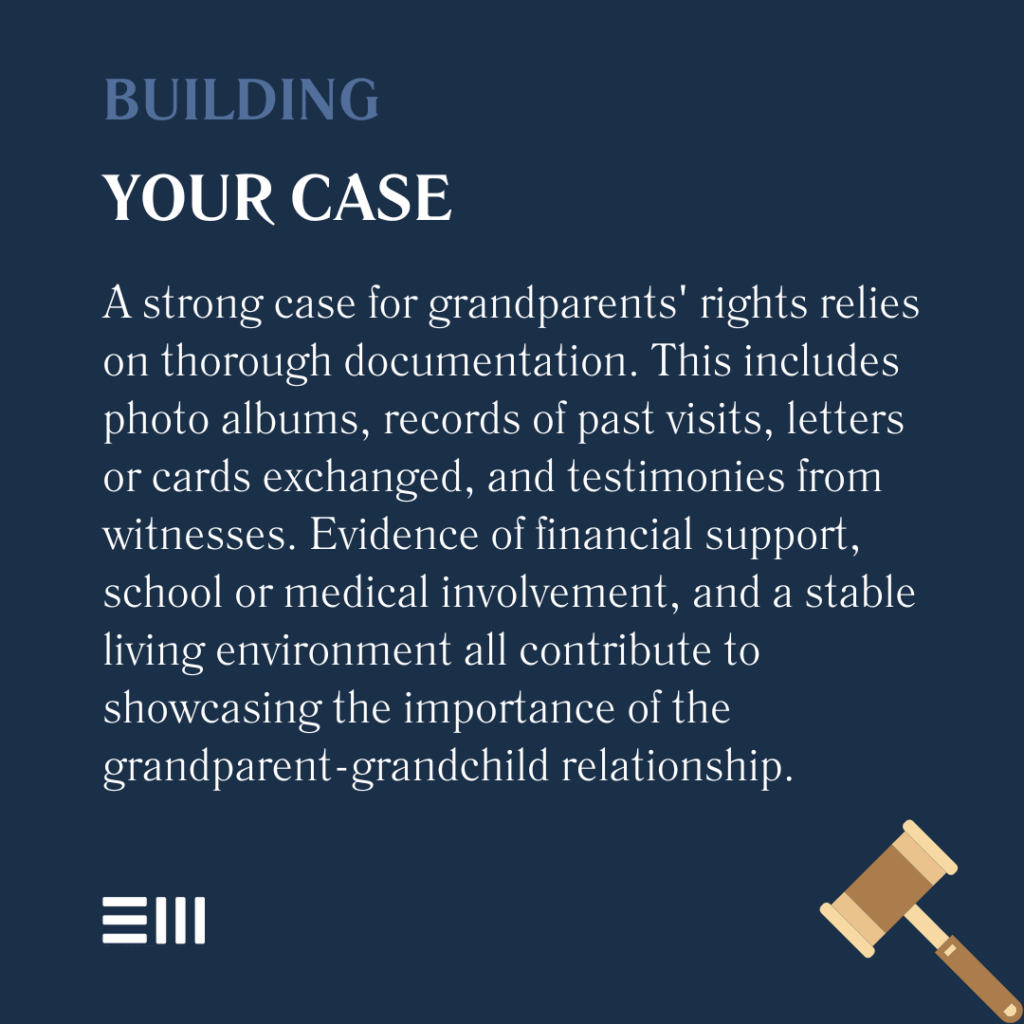
Behind closed doors across Alabama, grandparents struggle to maintain meaningful relationships with their grandchildren during family conflicts, divorce, or tragedy.
While the bond between grandparents and grandchildren shapes childhood memories and family traditions, these relationships sometimes need legal protection to endure.
Understanding how to navigate Alabama’s grandparents’ rights helps preserve these precious family connections for future generations.
Understanding Grandparents’ Rights in Alabama
Alabama law recognizes the vital role grandparents play in children’s lives while balancing parental rights.
The state’s approach to grandparents’ rights has evolved through various court decisions and legislative updates, creating specific pathways for grandparents to maintain relationships with their grandchildren.
Recent changes to Alabama’s grandparent visitation statutes have strengthened the legal framework supporting grandparents’ petitions, particularly in cases involving the death of a parent or when both parents agree to visitation.
These laws aim to protect both family bonds and parental authority while ensuring children maintain connections with their extended family members, who can provide additional emotional support and stability.
The courts consider multiple factors when evaluating grandparents’ rights cases, including the existing relationship between grandparent and grandchild, the potential benefits or detriments to the child, and the reasons behind any parental objections to visitation.
Legal Requirements for Filing
Before initiating legal proceedings for grandparents’ rights in Alabama, petitioners must understand and meet specific criteria.
Understanding these requirements helps strengthen the petition and increases the likelihood of a favorable outcome.
Essential requirements include:
- Demonstrating a prior existing relationship with the grandchild;
- Proving that losing contact would harm the child’s well-being;
- Showing evidence of attempts to maintain contact;
- Establishing that at least one of the qualifying circumstances exists;
- Gathering documentation of the relationship’s significance;
- Preparing evidence of your ability to provide a safe environment;
- Collecting character references and support documentation;
- Meeting residency requirements for Alabama courts;
- Demonstrating emotional and financial stability;
- Providing evidence of ability to facilitate visitation without disrupting the child’s routine;
- Showing willingness to work cooperatively with parents; and
- Establishing that visitation serves the child’s best interests.
Meeting these requirements forms the foundation of a strong petition for grandparents’ rights, though each case’s unique circumstances may require additional considerations.
Successful petitioners typically demonstrate not only their commitment to maintaining a relationship but also their understanding of appropriate boundaries and respect for parental authority.

Filing Process and Documentation
The process of filing for grandparents’ rights involves several carefully documented steps.
Understanding this process helps ensure proper submission and timely processing of your petition.
Key steps in the filing process include:
- Obtaining the necessary court forms from your county courthouse;
- Completing the petition for grandparent visitation rights;
- Gathering supporting documentation and evidence;
- Filing the petition with the appropriate court clerk;
- Paying required filing fees and court costs;
- Serving notice to all relevant parties;
- Scheduling initial court appearances;
- Preparing for mediation if required;
- Organizing evidence for court presentations;
- Following up on court schedules and deadlines;
- Maintaining detailed records of all communications;
- Creating a proposed visitation schedule;
- Documenting any current or past visitation arrangements;
- Preparing financial statements if required; and
- Obtaining professional evaluations if necessary.
Proper attention to these procedural requirements helps avoid delays and complications in your case’s progression. Working with an experienced family law attorney can help ensure all necessary documentation is properly prepared and filed.
Building Your Case
Creating a compelling case for grandparents’ rights requires thorough preparation and documentation.
A well-prepared presentation of evidence supports your petition and demonstrates your commitment to maintaining family relationships.
Important elements to include:
- Photo albums showing your relationship with the grandchild;
- Records of previous visitation and communication;
- Documentation of gifts, celebrations, and shared experiences;
- Letters or cards exchanged with the grandchild;
- Evidence of attempts to maintain contact;
- Witness statements about your relationship;
- School or medical records showing your involvement;
- Financial records of support provided;
- Character references from community members;
- Expert testimony if relevant;
- Documentation of special skills or resources you offer;
- Evidence of your involvement in the child’s activities;
- Records of any caregiving responsibilities;
- Proof of stable living environment; and
- Documentation of any special needs you can address.
These materials help paint a complete picture of your relationship with your grandchild and its importance to their well-being. The more comprehensive your documentation, the stronger your case becomes.

Legal Proceedings and Hearings
Court proceedings for grandparents’ rights follow a structured process designed to protect all parties’ interests. Understanding what to expect helps you prepare effectively for each stage of the legal process.
The typical progression includes:
- Initial hearing to establish standing;
- Mediation sessions with parents when appropriate;
- Evidence presentation hearings;
- Witness testimony proceedings;
- Judge’s evaluation of best interests;
- Temporary orders if applicable;
- Final hearing and order issuance;
- Post-order compliance monitoring;
- Modification proceedings if needed;
- Appeals process if necessary;
- Status review hearings as required;
- Emergency hearings if circumstances change;
- Enforcement proceedings if necessary;
- Modification hearings for changing circumstances; and
- Annual reviews if ordered by the court.
Success in these proceedings often depends on thorough preparation and professional legal representation. Each hearing serves a specific purpose in establishing and maintaining grandparents’ rights.
Understanding Visitation Arrangements
Once rights are granted, understanding how to maintain and manage visitation becomes crucial.
Successful visitation arrangements require flexibility, communication, and respect for all parties involved.
Key considerations include:
- Creating realistic visitation schedules;
- Maintaining consistent communication channels;
- Respecting parental boundaries and decisions;
- Following court-ordered guidelines strictly;
- Documenting all visits and interactions;
- Addressing changes or conflicts promptly;
- Working with parents on schedule adjustments;
- Maintaining appropriate behavior during visits;
- Supporting the child’s other activities; and
- Coordinating with other family members.
These arrangements work best when all parties focus on the child’s best interests and maintain open communication.
Frequently Asked Questions About Grandparents Rights in Alabama
Grandparents seeking legal rights to visit their grandchildren often share similar concerns and questions.
Here are detailed answers to common inquiries about pursuing grandparents’ rights in Alabama.
What Circumstances Allow Grandparents to File for Rights?
Qualifying circumstances include death of a parent, divorce of parents, abandonment by a parent, or termination of parental rights. Courts also consider cases involving extended separation or incarceration.
How Long Does the Process Take?
The timeline varies but typically ranges from three to twelve months, depending on case complexity and court schedules. Some cases may resolve quicker through mediation.
What if Parents Object to Visitation?
Courts consider parental objections seriously but may grant visitation if it serves the child’s best interests and meets legal criteria. The burden of proof lies with the grandparents.
Can Grandparents Request Custody Instead of Visitation?
Separate legal standards apply for custody requests, requiring proof of parental unfitness or voluntary relinquishment. These cases face higher legal hurdles.
What Happens if Visitation Orders Are Violated?
Courts can enforce visitation orders through various measures, including contempt proceedings and modified arrangements. Documentation of violations is crucial.
How Much Does Filing for Grandparents’ Rights Cost?
Costs vary by county and case complexity, including filing fees, attorney fees, and possible mediation expenses. Payment plans may be available.
Secure Your Family’s Future Today
Your relationship with your grandchildren deserves protection.
Our experienced family law attorneys understand the complexities of grandparents’ rights in Alabama and can help you navigate this challenging process while protecting your family bonds.
Contact us to discuss your situation and explore your legal options.
Can't find what you're looking for? Search our site below.










